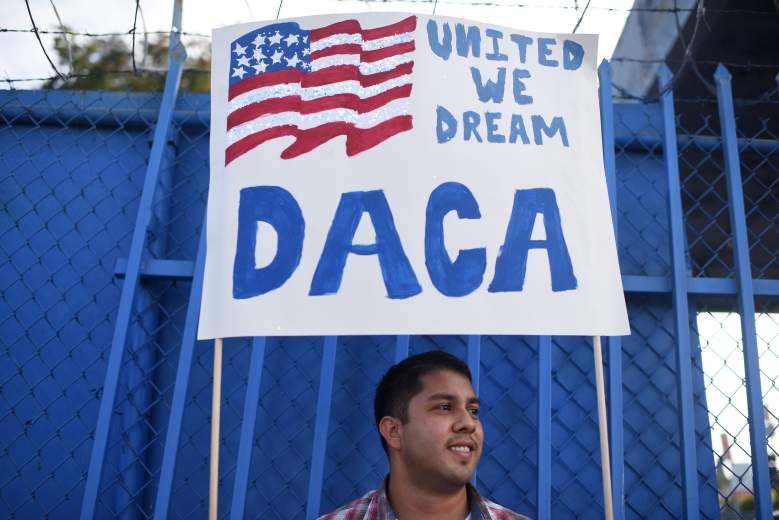
Getty SCOTUS declines Trump push to decide DACA.
The US Supreme Court Monday refused to hear an appeal from Pres. Trump to provide a swift ruling that would have green-lighted his plan to halt protections for ‘Dreamers.’
Nearly 800,000 young people are registered with the Deferred Action for Childhood Arrivals (DACA) program and the SCOTUS move to stay out of the lower court-case fight may keep protections in place for Dreamers but for how long is unclear. The Trump plan was to scrap DACA on March 5. That won’t happen now. A statement from White House Deputy Press Secretary Raj Shah makes it clear what the White House position is:the “The DACA program — which provides work permits and myriad government benefits to illegal immigrants en masse — is clearly unlawful. The district judge’s decision to unilaterally re-impose a program that Congress had explicitly and repeatedly rejected is a usurpation of legislative authority.”
What you need to know:
1.What Did Trump Want the SCOTUS to Do?
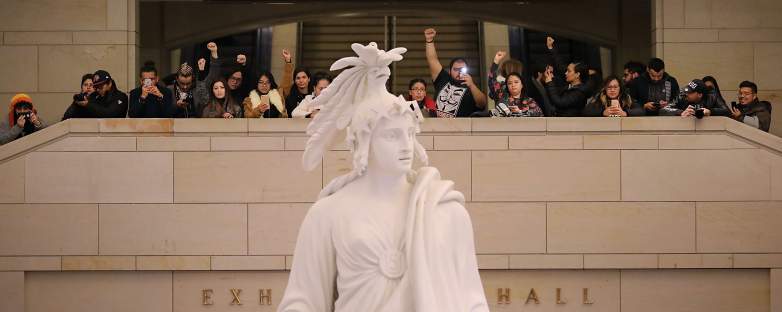
GettyDACA protest in 2017.
Trump’s Department of Justice was trying to go over the heads of the New York and California U.S. appeals courts asking for an instant review of the order made by Judge William Alsup U. S. District Court, of the Northern District of California that mandated the Trump administration maintain a DACA status quo. The move by the Trump Administration to have the Supreme Court usurp a lower court’s authority before an appeals process had run its course was a singular move.
Trump re-tweeted his White House tweet about immigration in a CPAC speech Sunday.
2. What SCOTUS Said In Its Decision Which Was Announced Monday
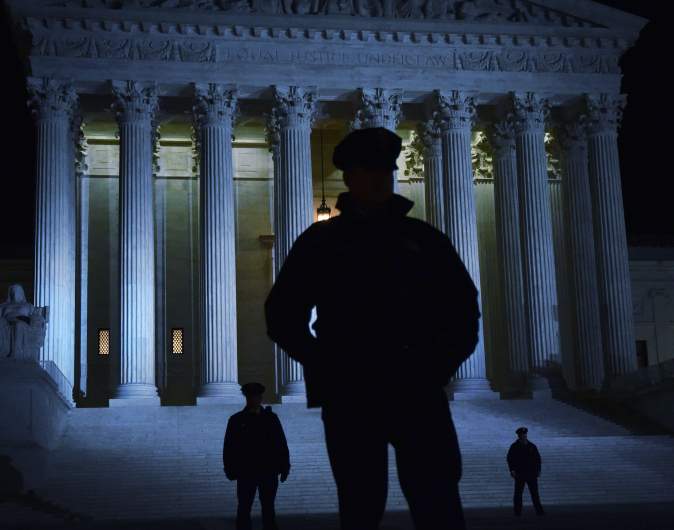
GettyOutside the Supreme Court in January 2017.
The court, without any justices disagreeing, said it was declining to hear this case without prejudice which means the Trump administration can come back to the high court when, and if, it has run the District Court appeal process and been overturned.
3. Some Worry That the Reprieve From the High Court Will Decrease the Necessity to Act on DACA
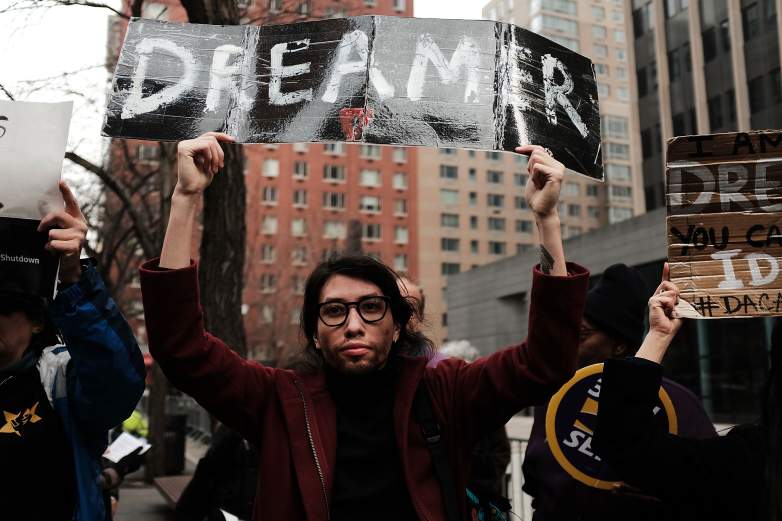
GettyDemonstrators protest the government shutdown and the lack of a deal on DACA in January, 2018.
Politico said that the Supreme Court decision to pass may dampen the urgency in Congress to create a legislative fix which has of late gotten stuck in a Congressioanl cul-de-sac.
And Sen. Richard Blumenthal, (D-CT) says Congress must act expeditiously, reprieve or not.
4.Here’s the Definition of the Deferred Action for Childhood Arrivals Law Known as DACA
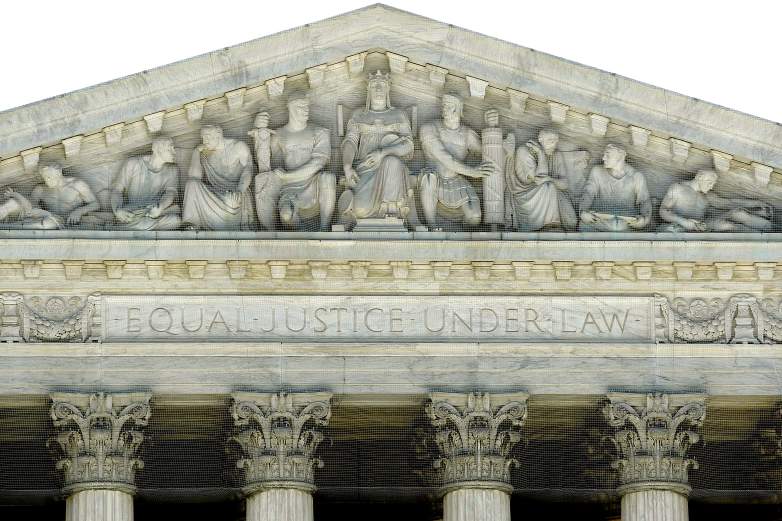
GettyThe US Supreme Court.
The Deferred Action for Childhood Arrivals (DACA), established by the Obama Administration in 2012 and expanded in 2014 by the 44th POTUS, allows immigrants who were brought to the US as children to apply for a renewable two-year visa so they can work, attend school and live in the US without fear of deportation. In September of 2017, US Attorney General Jeff Sessions said the Trump administration was pulling the plug on DACA.
“Good morning,” Sessions said on Sept. 5, 2017, “I am here today to announce that the program known as DACA that was effectuated under the Obama Administration is being rescinded.” He’d previously sent a letter to Department of Homeland Security Acting Director Elaine C. Duke saying he and the DOJ stood ready to “defend the constitution.” And he added, “In light of the costs and burdens that will be imposed on DHS associated with rescinding this policy, DHS should consider an orderly and efficient wind-down process.”
To be eligible for DACA young people had to have arrived in the US before age 16 and have lived here since June of 2007. As of 2017, approximately 800,000 individuals were enrolled in the program created by DACA. The precursor to DACA was the then-bipartisan DREAM Act of 2001.
5. It’s Not Unprecedented That the Supreme Court Decided Not To Get Involved in the DACA Case Just Yet
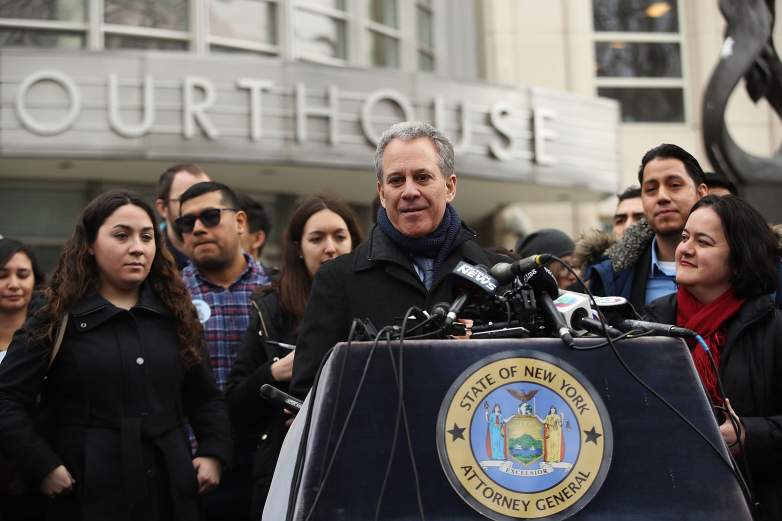
GettyNew York Attorney General Eric Schneiderman joins Dreamers and recent immigrants for a news conference.
Homeland Security’s page on DACA is archived and it is unclear if it will be updated with this announcement from the high court. What the page provides is direction for current DACA, future DACA and renewals for Dreamers but again, the status of the for Dreamers is opaque.
Though in January, a federal court ruled while the courts are deciding if the termination of DACA was unlawful, the government must still accept renewal applications, though no new registrants. Still, even in this notice from Immigrant Legal Resource Center, the case is still being decided and things may change.
New York State Attorney General Eric T. Schneiderman says despite the Trump “effort to circumvent the usual judicial process” protections remain in place. For Now.
The Supreme Court just denied @realDonaldTrump’s effort to circumvent the usual judicial process—ensuring that the preliminary injunctions we secured to block President Trump’s illegal and discriminatory rollback of #DACA remain in place for now. https://t.co/vOrllR61LV pic.twitter.com/gvgGwCcab2
— Eric Schneiderman (@AGSchneiderman) February 26, 2018
